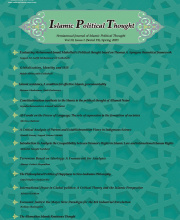۱.
کلید واژه ها:
Islam Power source of power goal of power
Western Scientists throughout history express various definition and goals for power; Most of political scientists believe that power is the main concept of politics and power is the goal of politics. They categorized the power into varies classifications. In this paradigm, power means Material instruments and there is no any place for the immaterial instruments. In the other hand Islam as a Monotheistic religion not only mentions the material aspects of political concepts; definitions that provided by Islamic scholars have differences and sometimes contradictory with western definitions. Power is part of politics (not purpose of politics) and it has not intrinsic value. Purpose of politics are guidance of the human to perfection, Establishment of order and justice and Prevention of cruelty. Unlike the western concept, the source of power and the source of its legitimacy is Allah. So in this paper I try to introduce the theory of power in Islam. The main question of this paper is: what is the definition of power in Islam and what are its differences with the western definitions.
۲.
کلید واژه ها:
Iran India Security Persian Gulf
The strategic map of Iran’s immediate neighborhood will change dramatically following the landmark nuclear deal between Iran and the P5+1. Given the tremendous geo-strategic stakes involved, Iran has already begun to explore greater opportunities for economic and security cooperation in the region. This has implications for both India and Pakistan, which are tied to Iran strategically, but bitterly opposed to each other. Per the realist prescription of international relations, survival in an anarchic world requires all states to adopt the certain rational behavior, such as power maximization and balancing strategies. Depending to a large extent on their worldviews, all state leaders translate their perceptions of the locational advantages and vulnerabilities into geopolitical strategies. Iran is preparing itself for a wider and internationally legitimized regional role in which it can act pragmatically to enhance its reputation and take advantage of commercial opportunities wherever it finds them. The peoples of India and Iran, two ancient neighboring civilizations, have enjoyed close historical links through the ages. They had a common homeland and share a common linguistic and racial past. Over the several millennia, they interacted an enriched each other in the fields of language, religion, arts, food, ideologically, academically, and culturally and other traditions. Today the two countries enjoy warm, friendly relations and cooperate in a wide range of fields.
۳.
کلید واژه ها:
Social Order Social Security Prophet Mohammad Seerah Holy Quran Islamic Tradition
Order and security and their dimensions in Islamic verses and tradition are individual and social necessities being in the center of the true religion of Islam’s attention. Order and security are interdependent. Security comes as a result of order, and with security, order continues. God has created human beings and knows everything about their inner and outer needs, therefore, he is aware of the order and security man needs to reach peace and tranquility. Thus, we should search for the characteristics of the secure society, in the discourse of God and his Prophets and Imams. This article is going to explain the ideal order and security of man in the Quran and Islamic tradition and the life style of innocent Imams (A. S.) employing descriptive-analytical method.
۴.
کلید واژه ها:
Islam Religion Allameh Tabatabaee Freedom of Thinking Freedom of Idea Human society
This paper intends to define and delimit the freedom of thinking and freedom of idea in Islam, emphasizing on Allameh Tabatabaee’s viewpoint and employing the technique of text-based, methodical interpretation data analysis through library referral to his works and pointing to freedom, its types and limits in Islam, its legitimacy and illegitimacy, and also the requirements of thinking freedom. To do so, after enumerating anthropological and ontological bases and defining the limits of freedom, the central topic of the paper, “the freedom of thinking” and “freedom of idea”, and their relationships and differences will be discussed, and finally this conclusion will be obtained that according to Allameh Tabatabaee, in Islam, the freedom of idea without pondering, is forbidden because it is opposed to freedom of thinking and is the origin of blind and causeless dogmatism, in spite of some recommendations represented in favor of it.
